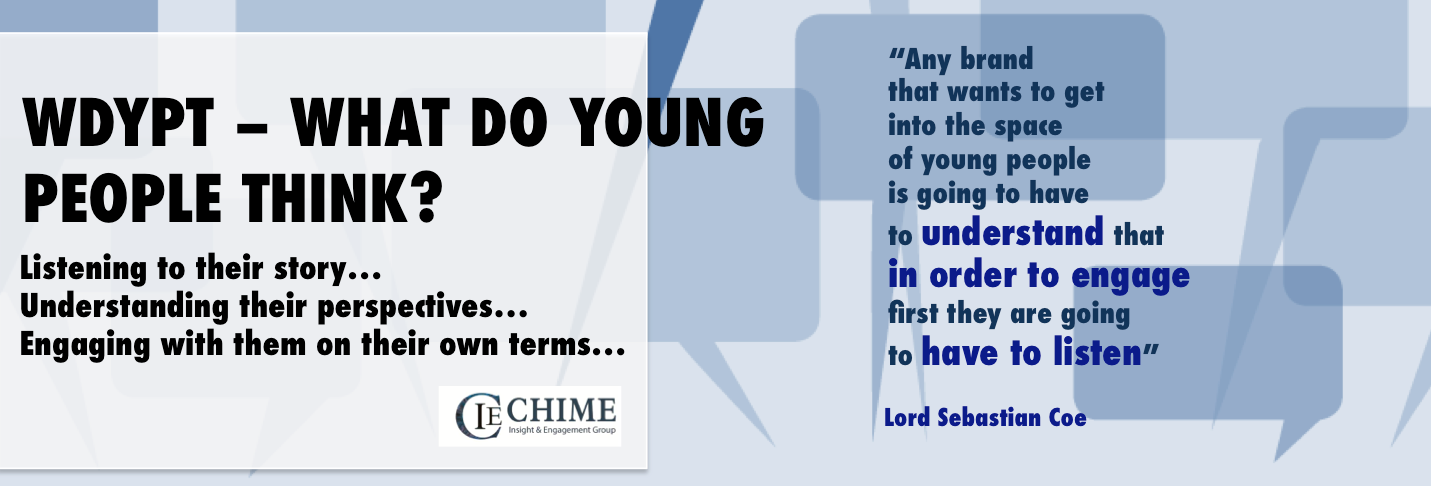Q: “How do you think your generation will be defined by other generations
to come?”
A: “Maybe people will say we were more creative, more driven, definitely
more competitive…more willing to create different identities just for social
media... the creation of fake people, probably not genuine people either”
A: “Like you can live your life with Facebook, you can be a completely
different person, you can be whoever you want to be as long as you are on the
internet and you have got a Twitter account and you know how to say the right
things. You have got Facebook and you can make your life look fantastic.”
What do young people actually
think about social media?
Today, they are linked inextricably
to the phenomenon of social media and attaching a virtual component to their
lives is done almost without thought by brands who seek to define them and to
engage them. And why wouldn’t brands do that? When we spoke to over 1,500 young
people this year, 78% of them said they were using social media ‘often’ or ‘all
the time’. It makes sense to attach a digital arm to this generation and it
makes sense for brands trying to connect with them, to reach them via these media
channels.
Or does it?
The thing is, social media has
exploded onto the scene and the uptake of social media by people has happened
so fast that we’re still reeling. Brands have scrambled to climb atop the wave
and push out their message via this new platform using a ‘tick box’ kind of
approach. Reach target number of ‘likes’ on Facebook? Tick. Adapt core
advertising message to 140 character nugget? Tick. Try and “have a
conversation” with consumers online? Tick. Sort of.
The thing is, by using this ‘tick
box’ approach to show that you “get” social media in the most elementary way,
you may be missing the point. Are these ticks actually useful at engaging your
target audience beyond surface value recognition? To determine that, you need
to unpack why young people are using social media and to understand how they
see it fitting into their lives.
Why you ask? Let us tell you.
 Sure, young people are online a lot
and use social media a lot but as everyone knows, this media channel is
fundamentally different to the media platforms that came before it in that it
is a platform for having a conversation rather than taking in information
without comment. Can you imagine if a phone call you were having with a friend
was interrupted every five minutes with an advert that mimicked the way you
talk to your friend? It’s a jarring thought isn’t it? It would annoy you,
wouldn’t it? Accordingly, when brands try to spread their message across this
media channel they need to understand the social graces, the cultural codes
that dictate appropriate behaviour.
Sure, young people are online a lot
and use social media a lot but as everyone knows, this media channel is
fundamentally different to the media platforms that came before it in that it
is a platform for having a conversation rather than taking in information
without comment. Can you imagine if a phone call you were having with a friend
was interrupted every five minutes with an advert that mimicked the way you
talk to your friend? It’s a jarring thought isn’t it? It would annoy you,
wouldn’t it? Accordingly, when brands try to spread their message across this
media channel they need to understand the social graces, the cultural codes
that dictate appropriate behaviour.
So, we decided to try to expose
those codes and to unpack what young people actually think and feel about their
social media use. This is where it got interesting.
Our research exposed a sense of
ambiguity among young people over the role they feel social media has to play
in their lives. They were inclined to be disdainful of over-reliance on social
media and of people who showed that over-reliance by sharing too much
personal information online.
They did not like addressing the
extent to which social media impacted their social lives. Even though most of
them are on it all the time and 47% agreed that they use it to stay in touch
with friends, only one in five of them agreed ‘if you don’t use social media,
you’re missing out on socialising’ and 27% strongly disagreed with the
statement.
Similarly, while only 18% agreed
with the statement “I use social media to showcase who I am and what I care
about” 64% of those surveyed felt that other young people share too much
information on social media and 51% felt that other people show a fake version
of themselves online. Virtually nobody felt that they were doing it, but
over half felt that other people were doing it.
Brands that try to mimic the
behaviours young people exhibit online might be missing the mark. Young people
might not like being confronted with those behaviours and it might not make
sense to them, for a brand to try and occupy their social media space. We know
young people use social media, but until we “get” how they think and feel about
this channel, we’re shooting blind trying to reach them through it.
An area for exploration, we think…









